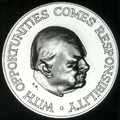| Founded | 1 February 1965 |
|---|---|
| Focus | Enhancing communities by providing opportunities for individuals to expand knowledge in other countries |
| Location |
|
| Origins | Living memorial to Sir Winston Churchill |
Area served | UK, Australia, New Zealand |
| Method | Travel Fellowships |
| Endowment | £2.75 million (UK:1965) [1] : 2 |
| Website | churchillfellowship.org churchilltrust.com.au dia.govt.nz |


Winston Churchill Memorial Trusts (WCMT) are three independent but related living memorials to Sir Winston Churchill, based in the United Kingdom, Australia, and New Zealand. [2] They exist for the purpose of administering Churchill Fellowships, also known as Churchill Travelling Fellowships, to provide an opportunity for applicants to travel overseas to conduct research in their chosen fields.
Contents
- History
- General
- UK
- Australia
- Description
- General 2
- UK 2
- Australia 2
- New Zealand
- Notable fellows by country and year
- United Kingdom
- Australia 3
- New Zealand 2
- See also
- References
- External links
The Trusts were established in 1965, after the death of Churchill, by a combination of public subscription and government contributions.
The operating name of the UK Trust is The Churchill Fellowship.